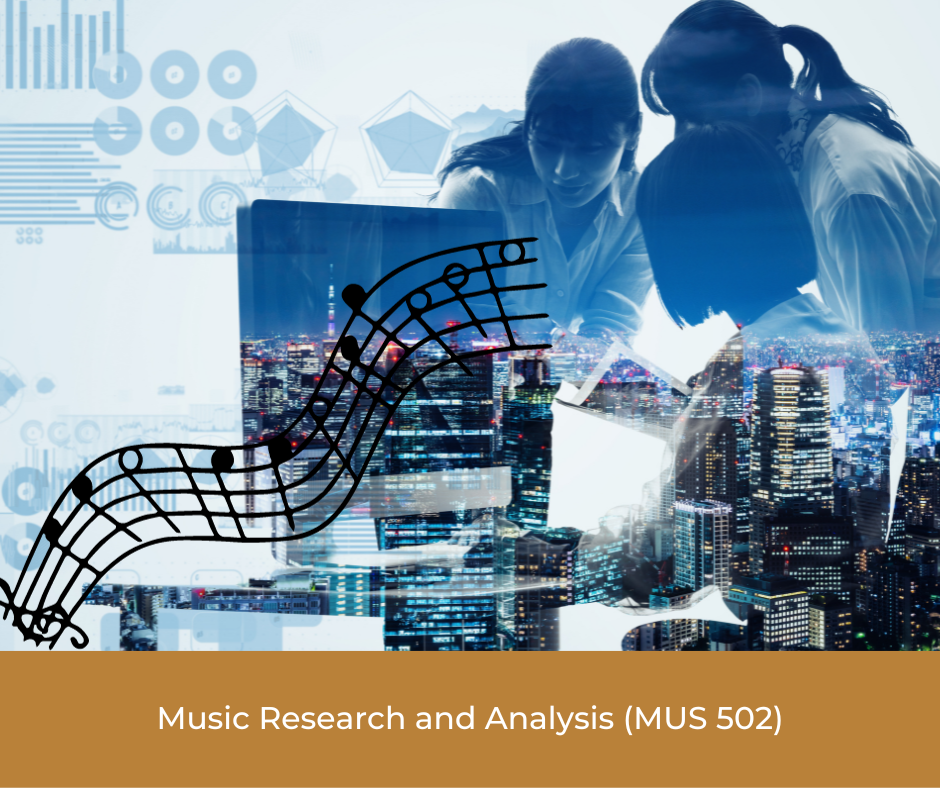Your cart is currently empty!
Music Research and Analysis (MUS 502)

Course Description – Music Research and Analysis (MUS 502):
MUS 502 is an advanced course that delves into the methodologies and practices of music research and critical analysis. Designed for students with a strong foundation in music, this course explores intricate topics in musicology, encourages the dissection of musical compositions, and hones the skills necessary for presenting scholarly research in the field of music.
Outline of Major Content Areas:
- Advanced Musicology:
- In-depth exploration of advanced concepts and theories in musicology.
- Examination of music in historical, cultural, and social contexts.
- Analytical Techniques:
- Comprehensive analysis of musical compositions from various periods and genres.
- Application of advanced analytical tools and methodologies.
- Research Methodologies:
- Study of research methods specific to musicology.
- Development of research proposals and scholarly projects.
- Critical Listening and Score Analysis:
- Advanced listening skills to deconstruct complex musical pieces.
- Analysis of musical scores to decipher compositional techniques.
- Presentation and Publication:
- Skills for presenting research findings in a scholarly manner.
- Strategies for publishing research in music journals and academic platforms.
- Musical Contexts and Interpretations:
- Exploration of music’s role in diverse cultural, historical, and social contexts.
- Interpretation of music’s impact on societies and individuals.
Course Learning Outcomes:
Upon successful completion of MUS 502, students will be able to:
- Advanced Musicological Knowledge: Demonstrate an in-depth understanding of advanced musicological concepts and theories.
- Analytical Proficiency: Effectively analyze and deconstruct complex musical compositions from different eras and genres.
- Research Competence: Apply research methodologies specific to musicology, including proposal development and project execution.
- Critical Listening and Score Analysis: Employ advanced listening skills and score analysis techniques to interpret complex music.
- Effective Presentation: Present research findings in a scholarly and persuasive manner suitable for academic and professional settings.
- Publication Readiness: Prepare research for publication in music journals and academic platforms.
- Cultural and Contextual Insights: Recognize and articulate the cultural, historical, and social contexts that influence musical works.
Methods for Assessing Student Learning:
To assess students’ progress and development in MUS 502, the following methods of assessment will be employed:
- Research Projects: Evaluation of students’ research projects, including proposal development, research execution, and presentation.
- Musical Analysis: Assessment of students’ ability to analyze and interpret complex musical compositions.
- Oral Presentations: Evaluation of students’ presentation skills when communicating research findings.
- Publication-Ready Research: Assessment of research papers prepared for potential publication.
- Examinations: Comprehensive assessments measuring knowledge of advanced musicological concepts and analytical techniques.
- Class Participation: Active engagement in class discussions, debates, and research-related activities.
- Peer Review: Encouraging students to provide constructive feedback on each other’s research projects.
These assessment methods will not only gauge students’ academic capabilities but also prepare them for careers in music research, analysis, and scholarly presentation.